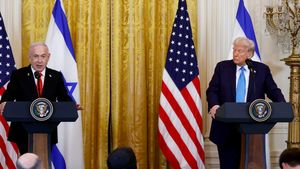The international trade scene is buzzing with tension over tariffs on electric vehicles (EVs), with the Biden administration's recent decision to impose a 100 percent tariff on Chinese EV imports shaking the automotive industry. This bold move, taken last September, reflects growing concerns about China’s aggressive support for its electric vehicle manufacturers through subsidies, which allegedly enable them to sell cars at artificially low prices. U.S. state representatives have voiced strong concerns, arguing this practice places American automakers at severe risk, leading to disadvantages in pricing and market competition.
These new tariffs are part of broader discussions about unfair trade practices around the world. Tariffs are levied primarily as mechanisms to shield domestic industries from what is termed "unfair" international competition—though some argue this justification is overstated. Nonetheless, policymakers are driving this narrative strong enough to garner public support for punitive tariffs against foreign-imported EVs.
Several countries, including India and members of the European Union, have been criticized for providing significant subsidies to specific industries, creating conditions whereby their products enter global markets at lower prices. Such practices raise the question: should the U.S. retaliate against such strategies with tariffs, potentially leading to broader global trade disputes?
The European Union is not sitting idly by either. A significant tariff regime has emerged there as well, particularly targeting imports of cheap Chinese EVs. Following the influx of these vehicles, the European Commission launched an investigation, concluding last year’s episode of what they termed "unfair advantage" leveraged by Beijing's decade-long subsidy programs. The resulting measures culminated in provisional import tariffs of up to 39%, later increasing due to the persistent threat posed to European automakers. Interestingly, this fast-moving situation has also ensnared established companies like BMW and Tesla, who produce many of their vehicles for the EU market from China.
Despite the tariffs being primarily aimed at Chinese manufacturers, industry giants like BMW and Tesla find themselves caught up in the regulatory crossfire, as their own imports from China now face significant extra costs. For Tesla, this is particularly troubling, as the company could potentially pass these costs onto consumers, making their already premium-priced EVs even less accessible.
The impact of such tariffs is serious. Analysts warn it could drive up production costs for automakers, as they will need to adapt their supply chains to deal with these new barriers. For example, estimates suggest the cost of purchasing EVs could increase substantially. Reports indicate Tesla could incur significant expenses—citing CFO Vaibhav Taneja mentioning previously, “Tariffs will have an impact on our business and profitability.”
Legal ramifications are already surfacing from these trade disputes. Companies like BMW and Tesla have filed cases against the European Commission’s tariffs, contesting the legality and fairness of such measures. They argue not only does this increase the burden on manufacturers but also curtails the growth of the entire electric vehicle segment—potentially threatening initiatives aimed at decarbonizing the transport sector.
These tariffs are nothing new, as they follow earlier trade tensions where the automotive industry felt the brunt of punitive economic actions between major global players. The international bickering can often deter innovation and investment, leaving consumers to bear the brunt of inflated prices. Already, companies invest heavily to adapt to fluctuated tariff rates imposed on them, resulting in uncertainty—not just about costs but also about job security and the overall market health.
The stakes could not be higher as this conflict of interests continues. The Biden administration's drive for tariffs could be rooted not just in securing immediate economic interests but also reflecting broader geopolitical strategies aimed at countering China's influence. Also noteworthy, with the continuous development of electric vehicles' technology, the protracted trade disputes have begun creating ripples across the entire international automotive framework, potentially reshaping global alliances.
Whether directly or indirectly, the fallout of these tariffs will continue to shape the industry's future. Did Biden’s administration overlook possible long-term consequences for the wilderness known as global trade, or is this all part of a larger strategy aimed at fostering home-grown technological advancements? It's clear these types of international disputes over electric vehicles are far from over.
Overall, the international automotive industry stands at the crossroads of innovation and protectionism, with the potential for war and peace hinging on how these tariff disputes develop. Amidst these rising tensions, the future success of popular electric vehicles will likely teeter on the delicate balance between fair trade practices and competitive market dynamics.



